海外留学生课程大纲中英文模板
高等学校外国留学生汉语长期进修教学大纲

高等学校外国留学生汉语长期进修教学大纲本大纲是为来华长期进修的留学生制定的,旨在明确对外汉语长期进修教学的性质和特点,规定其教学目标、等级结构、教学内容、教学原则,并对教学途径、教材编选以及测试进行指导。
各教学单位可按照本大纲的基本原则,根据各自的实际情况,制定具体实施办法。
一、教学性质与特点对外汉语长期进修教学,是对母语为非汉语的外国人和海外华人华侨进行的,半年以上、三年以下的,以提高汉语语言能力和汉语交际能力为主要目标的非学历教育,属于第二语言教学。
对外汉语长期进修教学具有如下特征:1、学习者学习目的多样,教学上应具有较强的针对性和适应性。
2、学习者入学水平参差不齐,组织教学时,分班宜细。
3、学习者学习期限不一,在教学上,宜将语言诸要素划分为螺旋式小循环递升的系统。
4、学习者的个体差异较大,在设课与选课上应具有较大的灵活性。
二、教学对象本大纲的教学对象是母语为非汉语的外国人和海外华人华侨,他们来华进行从半年到三年不等的汉语言文化进修。
初等阶段的学习者(包括零起点的初学者),入学前基本未掌握普通话语音或不会使用汉语拼音;未学过或基本未掌握汉语的基本语法结构;领会式词汇量在0—2000词之间,复用式词汇量在0—1000词之间;听说读写能力较差或发展很不平衡。
中等阶段的学习者,入学前已基本掌握了普通话语音;已学过并初步掌握汉语的基本语法结构;领会式词汇量在2000—4000词之间,复用式词汇量在1000—2000词之间;已具有初步的听说读写能力和用汉语进行日常生活交际的能力。
高等阶段的学习者,入学前已掌握了汉语的基本语法结构及一般的表达法;领会式词汇量在4000词以上,复用式词汇量在2000词以上;已具有中等的听说读写译的能力和用汉语进行一般交际的能力。
三、教学目标通过汉语长期进修教学,使学习者在原有基础上不同程度地进一步提高汉语交际能力,加深对中国的历史、文化和现状的了解。
对外汉语长期进修教学分为初等、中等、高等三个阶段。
国际留学生培养方案(纯英文版)
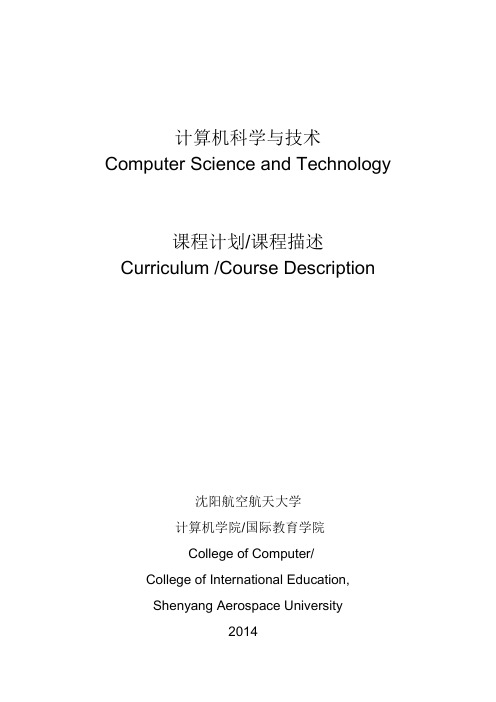
计算机科学与技术Computer Science and Technology课程计划/课程描述Curriculum /Course Description沈阳航空航天大学计算机学院/国际教育学院College of Computer/College of International Education,Shenyang Aerospace University2014ForewordMissionThe mission of the Computer Science and Technology Program is to cultivate senior engineering and technical personnel who possesses comprehensive professional abilities after mastering the skills and techniques in hardware, software and application aspects of modern computer areas. The program focuses on the training of the practical and engineering ability for students. Students will be well prepared to go in for the careers concerning academic research, education, enterprise and management immediately upon graduation in such areas as the scientific computing, computer teaching, computer engineering, hardware design and development of software and system integration.Programs Educational Objectives1. To have a certain natural science and humanistic science basic theory knowledge, the goodhumanistic quality.2. Prepare students to have the capabilities of preliminary scientific research, technologydevelopment and organizational management, utilize complementary non-technical skills such as communication skills, teamwork, leadership, ethical and societal responsibility considerations.3. Provide students with applied engineering experiences through hands-on laboratorycourses, internships, and cooperative education experience.4. To systematically understand and achieve the basic theory and application knowledge inComputer Science and technology.5. To master the skills and techniques in hardware, software and application with practicalexperience.6. To gain perfect programming and application development ability.7. To find a good career or job in IT field.Computer Science and TechnologyMedium of Education: EnglishComprehensive Chinese Ⅰ/Ⅱ/Ⅲ/Ⅳ/Ⅴ/Chinese for Science and Technology This course is aimed at developing students’ skills in listening, speaking, reading, and writing. It also focuses on improving basic communication competence in Chinese language.Introduction to ChinaThis course introduces students to the characteristic s of China’s social development, Chinese history, and culture, Chinese traditional thinking inheritance and innovation of Chinese life changes, China’s contribution to human civilization, and various manifestations of China’s modernization. It also introdu ces the students to China’s ideology of past, present, and future.Introduction to Chinese LawThis course introduces students to Chinese legal tradition and law, such as constitutionalism and rule of law, administrative law, civil law, marriage law, succession law, criminal law, and the procedural law. The course also focuses on fundamental and practical aspects of the Chinese law to familiarize international students about legal issues in China.Advanced MathematicsⅠ/ⅡThis course is designed to introduce the student to the main ideas of calculus. It is divided into two semesters.C Programming LanguageC Programming Language is a professional basic and pilot course of Computer Science & Technology.Here we’ll learn about the basic steps of programming using a kind of high-level programming language tool, C. We’ll learn relevant knowledge of grammar about C programming language, and based on which , learn how to analyze a specific question, how to design suitable data structure, how to design appropriate algorithm, how to edit, compile and debug a program , and at the end, to get the expected result with this high-level programming language. At the same time, We’ll know the essential procedure to deal with a question with a programming language, and lay a sound foundation for later study.College PhysicsⅠThis course is the introduction to classical mechanics, electromagnetism and special relativity. In classical mechanics, it includes motion in one and two dimensions, Newton’s laws ofmotion and their applications, work and energy, linear momentum and collisions, rotational motion, and principles of conservation. In electromagnetism, it covers a study of electric charges, forces, and field, Coulomb’s law, electric potential and electric potential energy, electric current, electric circuits, and an introduction to magnetism. In special relativity, it includes frame of reference, Galilean transformation, Michelson, Morley experiment, postulates of special theory of relativity, Lorentz transformation, length contraction, time dilation, relativity of simultaneity in addition to velocities, variation of mass with velocity, Mass energy equation.Discrete MathematicsDiscrete mathematics is the part of mathematics devoted to the study of discrete objects. Discrete mathematics is the gateway to more advanced courses in all parts of mathematical sciences. It provides the mathematical foundations for many computer science courses including data structures, algorithms, database theory ,formal languages, computer security and so on . Here we will cover propositional logic, quantifier logic , basic structures ,and will focus on relations , algebraic structures , lattice and Boolean algebra .The course is to teach mathematical reasoning and problem solving ,rather than a discrete set of skills.College Physics IIThis course introduces students to the laws of thermodynamics, wave motion, optics, and quantum physics. The student will learn about heat behaviors critical to understanding of engines and furnaces, metallurgy, geothermal system, etc. A mathematical description of wave motion will be introduced. The student will also learn about that light can be viewed as either a particle or a wave. The three primary topics examined are interference, diffraction, and polarization. These phenomena can’t be adequately explained with ray optics, but can be understood if light is viewed as a wave. For quantum physics, it introduces underlying ideas of quantum theory and the wave-particle nature of matter, and discusses applications of quantum theory including the photoelectric effect, the Compton Effect, and x-rays.Linear AlgebraThis course encompasses the study of linear equations, matrices, determinants, vectors in the plane and space, vector spaces, linear transformations, inner products, eigenvalues values and eigenvectors. Students will learn to recognize and express the mathematical ideas graphically, numerically, and symbolically.Algorithm and Data StructureThis is an undergraduate level course on common data structure used in programming. This course introduces some classical algorithms based on these data structures, which are described in C Language. It includes the following contents: linear list, array, graph, finding list, some ranking algorithms, key path algorithms, shortest path algorithms, minimum cost spanning tree algorithms, etc. This course is mainly based on lecture, and accompanied by some supplementary computer experiments. Students can practice their abilities about using different kinds of data structures and coding abilities.Fundamentals of Circuit AnalysisFundamentals of circuit analysis is the first professional basic course for telecommunication engineering and computer science major undergraduate students. It covers fundamentals of knowledge necessary in this field, such as basic concepts and laws for circuits, mesh and nodal analysis, circuit theorems, first-order circuit analysis, AC steady-state circuit analysis, single-phase and three-phase circuits.Analog Electronic CircuitsThis course is a technical basic course of Higher School, it focuses on training students' ability to analyze and solve problems. Through the curriculum learning, let students learn to read classic electronic circuit principle diagram and understand the composition and working principle of each part. Also able to qualitative or quantitative analysis /estimates the each part of circuit performance. Students can be roughly selected design scheme of circuit, Selects the related components and learn to install debug the circuit. So this course to strengthen introduced the basic concepts and basic unit of the circuit is and set up the training link. Courses also strengthen the basic principle and basic analysis method, Subsequent through experiment or design courses to cultivate students’ practical ability.Object Oriented Programming and JavaThis course will give students the essentials of object-oriented programming in Java. Students will learn to formulate algorithms, to solve problems and to implement those solutions with a Java program that employs objects and classes. The student will be introduced to object-oriented design, applications, and class construction, methods and message passing, arrays, string-processing, file processing, and some event-handling and graphical user interface programming. This course is designed for students with some prior programming experience. Experiments provide the opportunity to explore these concepts includingencapsulation, inheritance, polymorphism, graphical interface, multi-threading and network communications.Digital CircuitDigital logic is a compulsory course, degree course, and exam course for the undergraduate of electronic specialties. Digital logic also is the first discipline basic course directly related to many industry control systems. Through studying this course the students should master the basic concept of digital logic circuit, basic principles, basic methods and basic circuits. The students should learn the basic design method of the digital system and related technology. The students should be able to finish preliminary analysis and design of simple digital systems. Here we will learn about the logic algebra fundamental. We will focus on the basic analysis and design method of combinational circuits, sequential circuits, and pulse circuits. Digital laboratories can provide the opportunity to connect several typical logic circuits.Probability and StatisticsThis course provides an elementary introduction to probability and statistics with applications.Fundamentals of Computer Organization and ArchitectureIn this course, we will learn the fundamentals of computer organization and architecture, from basic concepts, to the principles of improving and designing for, the performance of computer system. We will cover computer evolution and performance, computer system, central processing unit and its control, parallel processing basics, as well as some necessary groundwork knowledge such as number system. Along with classroom teaching, a few hands-on experiments will be carried out to reinforce the students’ understanding.Operating SystemsThis course introduces the fundamental concepts of operating system design and implementation. The lectures present the central ideas and concepts and explain how they are manifested in real operating systems. The course divides into four major sections including process and thread management, memory management, I/O systems and storage management. Topics in the section of process and thread management include process concept, operations on process, process synchronization, inter process communication, CPU scheduling, deadlocks and threads. Topics in the section of memory management include contiguous memory allocation, segmentation, paging and virtual memory. Topics in the section of storagemanagement include disk management and file systems. Topics in the section of I/O systems include I/O hardware, application I/O interface, kernel I/O subsystem, transforming I/O requests to hardware operations. The class work also consists of a series of four programming lab experiments in order to improve students' understanding of the theoretical knowledge in lectures.Computer NetworksThis is a technical fundamental course for undergraduate students in the Computer Science and Technology program and is offered as an introduction to Computer Networks. We will discuss five layers of Computer networks which include physical layer, data link layer, network layer, transport layer and application layer.Computer GraphicsComputer Graphics is a professional compulsory course for C.S. &T.. The course introduces many important data structures, fundamental algorithms and techniques for 2D and 3D computer graphics that are useful for presenting data visually on a computer. We will start by studying the basic process of drawing primitive objects on a display (lines, circles, polygons). And then look at the process of building two and three dimension mathematical models of more complex objects, manipulating and combining these models, and projecting the models onto a two dimensional image space. Along the way we'll also spend some time on windowing systems and on drawing more complex primitive objects such as curves and surfaces. The course covers the following topics: the basic concepts of computer graphics, development and application of computer graphics, the composition of the graphics system,basic graphics generation algorithm,graphics transformation, curves and surfaces, Open Gl Programming Fundamentals.Micro-controller’s Principle and ApplicationThis course introduces students to microprocessor and micro-controller technologies covering the theory of micro-controller architecture, instruction set, assembly language programming, analogy and digital peripherals, interrupts, parallel and serial interfacing. The 8-bit Intel 8051 micro-controller is selected for laboratory training sessions.Principles of Database SystemThis course is a required course for computer majors. This course covers fundamentals of database architecture, database management systems, and database systems,principles andmethodologies of database design, and techniques for database application development. It will help students to develop an understanding of database models with the emphasis on relational database, the concept and mathematical foundations of relational database, the formalization of relations, the SQL database definition/manipulation language, transaction management, and entity relationship database design method.Software EngineeringBuilding large software systems is hard, and the building large software systems that is actually work is even harder. As an important basic course of college computer specialty, it covers the techniques for dealing with the complexity of software systems development. It is dedicated to designing, implementing, and modifying software so that it is of high quality, affordable, standard and measurable. It is a systematic approach to every link of software development includes system architecture analysis, design, implementation, test, maintenance, and system architecture design and software project management. After the studying of this course, students can be qualified for the job of Large and medium-sized software project development or management independently.Computer ChineseThis course is designed to introduce the Chinese expression of the computer concept and principle, such as the computer system composition, code mode, network communication, computer graphics, quantum computing, cloud computing and other modern computer concept and principle. In addition, the relations of computer to modern society are discussed also. Through studying above curricula content, the students are expected to acquire elementary ability of reading and comprehending computer specialty Chinese literature.Introduction to Artificial IntelligenceThis course introduces to students the basics of artificial intelligence, which includes problem solving, knowledge representation and reasoning, learning methods, and some application topics such as computer vision and natural language processing.The objective of this class is to teach modern AI. Students learn about the basic techniques and tricks of the trade. After finishing the class students should understand the role of knowledge representation, problem solving, and learning in intelligent-system engineering, appreciate the role of problem solving, vision, and language in understanding human intelligence from a computational perspective, and be able to develop intelligent systems by assembling solutions to concrete computational problems.Digital image processingDigital image processing has relation with many research areas, from which the students can grasp the basic concepts, ideas, methods, and applications of digital image processing. The course can be divided into two phases. In the first phase, basic knowledge of digital image is introduced, and the usual techniques for image generation and spatial enhancement are discussed. In the second phase, techniques to improve the image quality are analyzed, and they are image transformation, frequency enhancement, color image, image recovery, and so on. The course can help the students improve their abilities to analyze and resolve problems, and prepare their future research & develop work related with digital image processing. Assessment of the course includes examination and homework.Information SecurityThe aim of this course is to provide attendees with a thorough understanding of the issues associated with the protocol, principle and method of information systems. We will learn the different aspects of information security such as crypto, access control and protocols. Student will be able to speak about a multitude of security attacks and the defensive strategies used to combat them and evaluate security in information processing systems (operating systems and applications, networks, and so on).。
外国留学生学汉语课程介绍
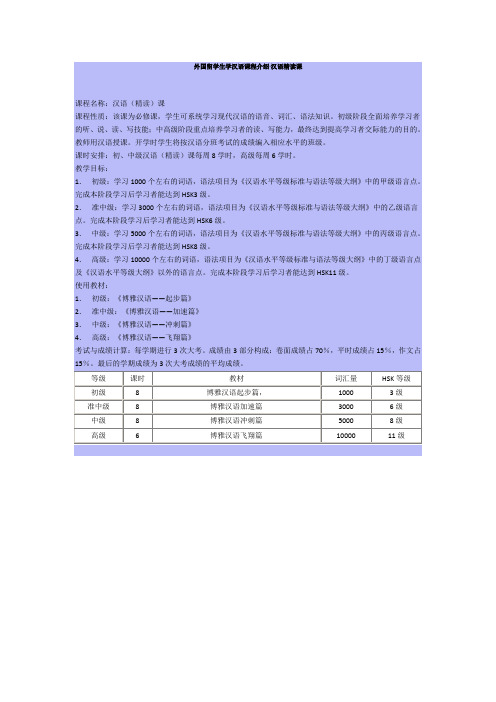
4.高级:学习10000个左右的词语,语法项目为《汉语水平等级标准与语法等级大纲》中的丁级语言点及《汉语水平等级大纲》以外的语言点。完成本阶段学习后学习者能达到HSK11级。
使用教材:
1.初级:《博雅汉语——起步篇》
2.准中级:《博雅汉语——加速篇》
3.中级:《博雅汉语——冲刺篇》
4.高级:《博雅汉语——飞翔篇》
考试与成绩计算:每学期进行3次大考。成绩由3部分构成:卷面成绩占70%,平时成绩占15%,作文占15%。最后的学期成绩为3次大考成绩的平均成绩。
等级
课时
教材
词汇量
HSK等级
初级
8
博雅汉语起步篇,
1000
3级
准中级
8
博雅汉语加速篇
3000
6级
中级
8
博雅汉语冲刺篇
5000
8级
高级
6
博雅汉语飞翔篇
10000
11级
课时安排:初、中级汉语(精读)课左右的词语,语法项目为《汉语水平等级标准与语法等级大纲》中的甲级语言点。完成本阶段学习后学习者能达到HSK3级。
2.准中级:学习3000个左右的词语,语法项目为《汉语水平等级标准与语法等级大纲》中的乙级语言点。完成本阶段学习后学习者能达到HSK6级。
外国留学生学汉语课程介绍·汉语精读课
课程名称:汉语(精读)课
课程性质:该课为必修课,学生可系统学习现代汉语的语音、词汇、语法知识。初级阶段全面培养学习者的听、说、读、写技能;中高级阶段重点培养学习者的读、写能力,最终达到提高学习者交际能力的目的。教师用汉语授课。开学时学生将按汉语分班考试的成绩编入相应水平的班级。
签证出国学习计划英文版

签证出国学习计划英文版IntroductionStudying abroad is an exciting opportunity to broaden your horizons, immerse yourself in a new culture, and gain a world-class education. However, before you can embark on this life-changing journey, you need to secure a study visa for your chosen destination. This plan will outline the steps and requirements for obtaining a study visa, as well as provide a timeline for the application process.Destination and Program SelectionThe first step in the study abroad visa plan is to carefully research and select your destination and academic program. Consider factors such as the reputation of the institution, the quality of the program, the cost of living, and the cultural and social environment. Once you have chosen your destination and program, verify the visa requirements for studying in that country. Different countries have different visa regulations, so it is crucial to thoroughly research the specific requirements for your chosen destination.Application TimelineOnce you have chosen your destination and program, it is essential to establish a timeline for the visa application process. Visa processing times can vary greatly depending on the country, so it is important to allow ample time for the application to be processed. Typically, it is recommended to begin the visa application process at least 3-6 months before your intended departure date. This will allow enough time for any unforeseen delays or complications that may arise during the application process.Visa RequirementsAfter establishing the application timeline, the next step is to gather all the necessary documents and meet the visa requirements for your chosen destination. Common visa requirements for studying abroad include:1. Proof of acceptance into a recognized educational institution2. Proof of financial means to support yourself during your studies3. Medical and health insurance coverage4. Valid passport5. A clean criminal record6. Visa application form7. Passport-sized photographs8. Proof of accommodation in the host countryIt is important to carefully review the specific visa requirements for your chosen destination to ensure that you have all the necessary documents and meet all the criteria for the visa application.Visa Application ProcessOnce you have gathered all the required documents and met the visa requirements, the next step is to initiate the visa application process. This typically involves submitting the required documents to the embassy or consulate of the host country, either in person or by mail. Some countries may also require applicants to attend an in-person interview as part of the visa application process.It is crucial to carefully follow the instructions provided by the embassy or consulate and to submit all required documents in a timely manner. Any missing or incomplete documents can delay the visa application process, so it is important to double-check that all requirements have been met before submitting the application.Visa Processing and ApprovalOnce the visa application has been submitted, the processing time can vary depending on the country and the volume of applications being processed. It is important to regularly check the status of the visa application and to follow up with the embassy or consulate if there are any delays or issues.Upon approval of the visa, it is important to carefully review the conditions and validity of the visa, as well as any additional requirements for entering the host country. It is also recommended to make a copy of the visa and keep it in a safe place, in case the original is lost or stolen during your travels.Pre-Departure PreparationAfter the visa has been approved, the final step in the study abroad visa plan is to make all necessary preparations for departure. This includes arranging travel logistics, securing accommodation, purchasing travel insurance, and attending any pre-departure orientation sessions required by the educational institution or the host country. It is also important to familiarize yourself with the local customs, culture, and legal requirements of the host country to ensure a smooth transition to your new environment.ConclusionObtaining a study visa for studying abroad is a multi-step process that requires careful planning, attention to detail, and adherence to the visa requirements of the host country. By following the steps outlined in this plan and allowing ample time for the visa application process, you can maximize your chances of securing a study visa and embarking on asuccessful and fulfilling study abroad experience. Good luck with your studies and your exciting journey ahead!。
出国留学学习计划书英文
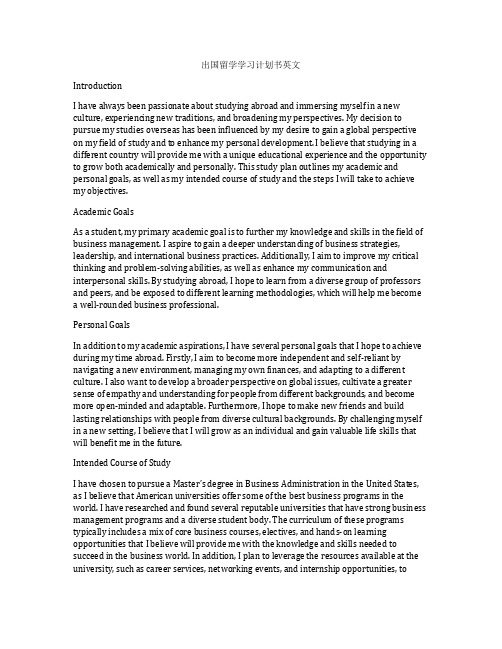
出国留学学习计划书英文IntroductionI have always been passionate about studying abroad and immersing myself in a new culture, experiencing new traditions, and broadening my perspectives. My decision to pursue my studies overseas has been influenced by my desire to gain a global perspective on my field of study and to enhance my personal development. I believe that studying in a different country will provide me with a unique educational experience and the opportunity to grow both academically and personally. This study plan outlines my academic and personal goals, as well as my intended course of study and the steps I will take to achieve my objectives.Academic GoalsAs a student, my primary academic goal is to further my knowledge and skills in the field of business management. I aspire to gain a deeper understanding of business strategies, leadership, and international business practices. Additionally, I aim to improve my critical thinking and problem-solving abilities, as well as enhance my communication and interpersonal skills. By studying abroad, I hope to learn from a diverse group of professors and peers, and be exposed to different learning methodologies, which will help me become a well-rounded business professional.Personal GoalsIn addition to my academic aspirations, I have several personal goals that I hope to achieve during my time abroad. Firstly, I aim to become more independent and self-reliant by navigating a new environment, managing my own finances, and adapting to a different culture. I also want to develop a broader perspective on global issues, cultivate a greater sense of empathy and understanding for people from different backgrounds, and become more open-minded and adaptable. Furthermore, I hope to make new friends and build lasting relationships with people from diverse cultural backgrounds. By challenging myself in a new setting, I believe that I will grow as an individual and gain valuable life skills that will benefit me in the future.Intended Course of StudyI have chosen to pursue a Mas ter’s degree in Business Administration in the United States, as I believe that American universities offer some of the best business programs in the world. I have researched and found several reputable universities that have strong business management programs and a diverse student body. The curriculum of these programs typically includes a mix of core business courses, electives, and hands-on learning opportunities that I believe will provide me with the knowledge and skills needed to succeed in the business world. In addition, I plan to leverage the resources available at the university, such as career services, networking events, and internship opportunities, toenhance my learning experience and prepare myself for a successful career in business management.Steps to Achieve ObjectivesTo achieve my academic and personal goals, I have devised a plan that includes the following steps:1. Research and Select a University: I will conduct thorough research on various universities with reputable business management programs, and select the one that best fits my academic and personal needs. I will consider factors such as program structure, faculty expertise, campus life, and location.2. Apply for Admission: Once I have identified the universities I am interested in, I will begin the application process, which may include taking standardized tests, gathering required documents, and writing personal statements. I will adhere to the application deadlines and ensure that all materials are submitted accurately and on time.3. Secure Funding: Studying abroad can be financially demanding, so I will explore scholarship opportunities, financial aid, and student loans to help finance my education. I will also create a budget and plan for living expenses during my time overseas.4. Prepare for Cultural Adjustment: Moving to a new country can be challenging, so I will educate myself about the culture, customs, and language of the host country to prepare for the transition. I will also seek advice from alumni who have studied abroad and learn from their experiences.5. Engage in Extracurricular Activities: I intend to participate in extracurricular activities, such as clubs, student organizations, and volunteer work, to meet new people, explore my interests, and enrich my overall college experience.6. Network and Seek Internship Opportunities: I will actively network with professors, professionals, and fellow students to build connections and seek internship opportunities that will provide practical experience and exposure to the business world.7. Monitor Progress and Seek Guidance: Throughout my time abroad, I will regularly assess my progress towards achieving my goals and seek guidance from academic advisors, career counselors, and mentors. I will take advantage of resources available to me and make adjustments to my plan as necessary.ConclusionStudying abroad offers a wealth of opportunities for personal and academic growth, and I am excited about the prospect of embarking on this journey. By pursuing a Master’s degree in Business Administration in the United States, I hope to gain a global perspective on business management and develop the skills needed to succeed in the field. I am committed to pursuing my academic and personal goals by following the steps outlined in this studyplan. I believe that by immersing myself in a new environment, I will become a more well-rounded individual and set the foundation for a successful career in business management.。
出国留学前英语学习计划
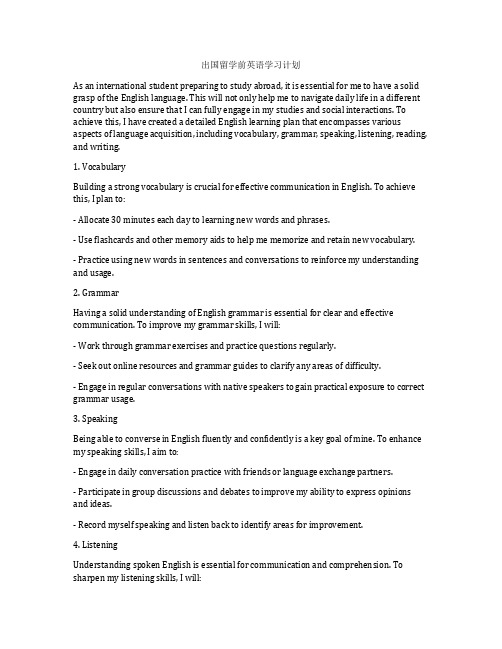
出国留学前英语学习计划As an international student preparing to study abroad, it is essential for me to have a solid grasp of the English language. This will not only help me to navigate daily life in a different country but also ensure that I can fully engage in my studies and social interactions. To achieve this, I have created a detailed English learning plan that encompasses various aspects of language acquisition, including vocabulary, grammar, speaking, listening, reading, and writing.1. VocabularyBuilding a strong vocabulary is crucial for effective communication in English. To achieve this, I plan to:- Allocate 30 minutes each day to learning new words and phrases.- Use flashcards and other memory aids to help me memorize and retain new vocabulary. - Practice using new words in sentences and conversations to reinforce my understanding and usage.2. GrammarHaving a solid understanding of English grammar is essential for clear and effective communication. To improve my grammar skills, I will:- Work through grammar exercises and practice questions regularly.- Seek out online resources and grammar guides to clarify any areas of difficulty.- Engage in regular conversations with native speakers to gain practical exposure to correct grammar usage.3. SpeakingBeing able to converse in English fluently and confidently is a key goal of mine. To enhance my speaking skills, I aim to:- Engage in daily conversation practice with friends or language exchange partners.- Participate in group discussions and debates to improve my ability to express opinions and ideas.- Record myself speaking and listen back to identify areas for improvement.4. ListeningUnderstanding spoken English is essential for communication and comprehension. To sharpen my listening skills, I will:- Listen to English podcasts, news broadcasts, and audiobooks on a regular basis.- Watch English movies and TV shows, paying attention to different accents and speech patterns.- Take notes while listening to spoken English to improve my ability to retain information.5. ReadingDeveloping strong reading skills in English will help me to access a wide range of academic and leisure materials. To improve my reading abilities, I will:- Read English books, newspapers, and magazines regularly, focusing on a variety of genres and topics.- Explore online resources and e-books to access a diverse range of reading materials.- Discuss and analyze what I have read with others to deepen my understanding and critical thinking skills.6. WritingClear and effective writing is essential for academic success, as well as for personal and professional communication. To improve my writing skills, I will:- Practice writing essays, reports, and creative pieces on a regular basis.- Seek feedback from teachers, peers, or tutors to identify areas for improvement.- Study different writing styles and techniques to expand my repertoire and enhance my expressive abilities.In addition to the specific language learning activities mentioned above, I will also make use of various resources and tools to support my English learning journey, such as language learning apps, online courses, and language exchange programs. I will also seek out opportunities for immersive language experiences, such as living with English-speaking roommates or joining language clubs and meetups.Throughout my English learning process, I will regularly assess my progress and set new goals to ensure that I am continually improving. By following this comprehensive learning plan, I am confident that I will be well-prepared to study abroad and engage fully in the academic and social opportunities that await me in an English-speaking environment.。
《中文读写》课程教学大纲

7.能掌握写作论点明确、条理清晰、语言通畅的论说文或读后感之类的文章的能力。
*教学内容进度安排及对应课程目标& &CourseObjectives
章节
教学内容(要点)
学时
教学形式
作业及考核要求
课程思政融入点
对应课程目标
以下各项内容为相互穿插讲解并练习。
1
基本语法讲解介词、副词、代词、关联词、固定格式、句型、修辞分析
3.intensive reading speed of intermediate reading materials will be 150-180 words per minute with over 90% comprehension;their scanning speed will be 400 words with over 80% comprehension;
*课程简介(英文)(Description)
(英文300-500字)
This course of the intermediate series will focus on non-native speakers language reading and writing skills.The instructor will systematically lecture on the language learning including written language,vocabulary,grammar,rhetoric,idioms and proverbs,combining practice in reading and writing of various topics and genres.
英文教学大纲模板模板
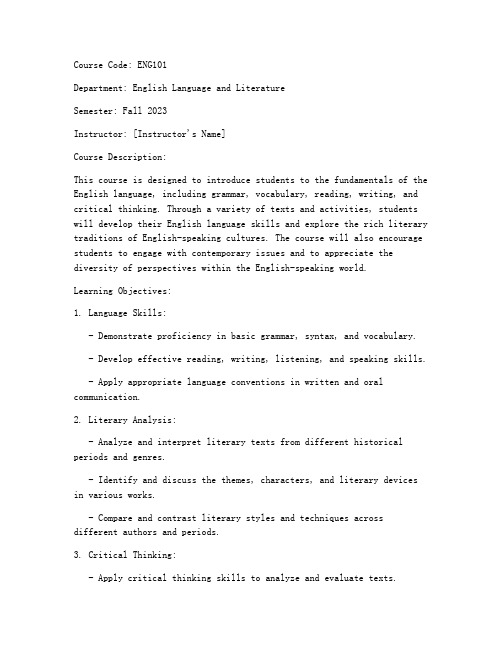
Course Code: ENG101Department: English Language and LiteratureSemester: Fall 2023Instructor: [Instructor's Name]Course Description:This course is designed to introduce students to the fundamentals of the English language, including grammar, vocabulary, reading, writing, and critical thinking. Through a variety of texts and activities, students will develop their English language skills and explore the rich literary traditions of English-speaking cultures. The course will also encourage students to engage with contemporary issues and to appreciate the diversity of perspectives within the English-speaking world.Learning Objectives:1. Language Skills:- Demonstrate proficiency in basic grammar, syntax, and vocabulary.- Develop effective reading, writing, listening, and speaking skills.- Apply appropriate language conventions in written and oral communication.2. Literary Analysis:- Analyze and interpret literary texts from different historical periods and genres.- Identify and discuss the themes, characters, and literary devices in various works.- Compare and contrast literary styles and techniques acrossdifferent authors and periods.3. Critical Thinking:- Apply critical thinking skills to analyze and evaluate texts.- Formulate well-reasoned arguments and support them with evidence from the texts.- Develop a reflective and analytical approach to learning and writing.4. Cultural Awareness:- Recognize and appreciate the cultural contexts in which literature is produced.- Engage with a variety of perspectives and experiences within the English-speaking world.- Develop an understanding of the role of literature in reflecting and shaping culture.Course Content:Week 1-2: Introduction to the Course- Course overview and objectives- Introduction to the instructor- Course policies and expectations- Grammar review: Parts of speech, sentence structure, and basic sentence patterns- Vocabulary building exercisesWeek 3-4: Reading and Analysis- Introduce to the elements of fiction: characters, plot, setting, and theme- Read and analyze short stories from different historical periods- Discuss literary analysis techniques and critical thinking skills- Writing assignment: Short analysis of a selected short storyWeek 5-6: Poetry and Poetic Devices- Introduce to poetry and its characteristics- Analyze various poetic forms and devices (e.g., meter, rhyme, imagery)- Read and discuss poems from different poets and periods- Writing assignment: Creative writing: a poem inspired by a selected poemWeek 7-8: Drama and Dramatic Elements- Introduce to the elements of drama: characters, conflict, and setting- Analyze plays from different historical periods- Discuss the role of the audience in theater- Writing assignment: Short play script based on a historical event or characterWeek 9-10: Non-Fiction and Journalism- Introduce to non-fiction genres: biography, essay, and journalism- Analyze non-fiction texts and discuss the role of the author and the audience- Explore the ethical considerations in journalism- Writing assignment: Argumentative essay on a current issue or eventWeek 11-12: Literary Theory and Criticism- Introduce to literary theories: formalism, structuralism, deconstruction, etc.- Analyze texts from a theoretical perspective- Discuss the role of criticism in literature- Writing assignment: Critical analysis of a literary text using a selected theoretical approachWeek 13-14: Review and Exam Preparation- Review course content and key concepts- Discuss common exam formats and strategies for success- Offer support for exam preparation and anxiety management- Final Exam (50% of the final grade)Assessment:- Quizzes (10%): Short quizzes on vocabulary and grammar.- Writing Assignments (30%): Include short essays, creative writing, and analysis papers.- Participation (10%): Active participation in class discussions and activities.- Final Exam (50%): Comprehensive exam covering the entire course content.Course Materials:- Textbooks:- "Introduction to Literature" by X. Y. Z.- "Grammar in Context" by A. B. C.- Supplementary Materials:- Online resources and readings provided by the instructor.- Access to a library or online database for additional research materials.Grading Policy:- A (90-100): Excellent performance, demonstrating a deep understanding of the course content and skills.- B (80-89): Good performance, with a strong grasp of the material and evidence of critical thinking.- C (70-79): Satisfactory performance, with a basic understanding of the course content.- D (60-69): Minimum performance, with some understanding of the material but significant gaps in knowledge.- F (Below 60): Unsatisfactory performance, with a lack of understanding of the course content.Academic Integrity:All students are expected to adhere to the academic integrity policy of the institution. Plagiarism, cheating, and any form of academic dishonesty will not be tolerated and will result in appropriate disciplinary action.Support Services:Students are encouraged to seek help from the instructor or the campus writing center for any academic or personal issues that may affect their performance in the course. Additionally, students with disabilities should contact the disability services office to arrange for necessary accommodations.Course Schedule:- Class Meetings: Mondays and Wednesdays, 10:00 AM - 11:50 AM- Office Hours: By appointment, [Instructor's Office Location]Additional Information:Students are expected to attend all class meetings and to complete all assigned work. Absences and late submissions may affect the final grade. It is the student's responsibility to keep up with the course material and to communicate with the instructor regarding any concerns or issues that arise during the semester.。
(中英文模板)课程教学大纲+CourseSyllabus

一、课程基本信息
课程代码:
课程名称:
开课院系:
授课对象:
课程学分:
课程学时:
(其中,理论课程学时,实践课程学时)
授课教师:(负责人)
姓名:
邮箱:
办公室:
电话:
授课教师:(团队成员)
姓名:
邮箱:
办公室:
电话:
课程类别:(公共基础课程/基础通识课程/核心通识课程/一般通识课程/大类平台课程/专业必修课程/专业选修课程)
Instructor:(main)
Name:
Email:
Office:
Phone:
Instructor:(team members)
Name:
Email:
Office:
Phone:
Category:(公共基础课程Common Core Courses/基础通识课程Basic General Courses/核心通识课程Key General Courses/一般通识课程General Courses/大类平台课程General Courses for Major/专业必修课程Required Courses for Major/专业选修课程Elective Courses for Major)
前导课程:
2、课程简介(500字以内)
3、课程内容与学时分配
内容
学时
4、课程成绩评定
5、教材及参考书
《XX》Course Syllabus
I.Basic Information
Course Code:
Course Title:
nt:
Students:
Credits:
Hours:
留学生汉语教学大纲

留学生汉语教学大纲一、课程简介留学生汉语课程是为了帮助留学生提高汉语水平,适应中国社会和文化而设计的。
本课程旨在通过系统的语法、词汇、听力、口语、阅读和写作训练,使学生能够全面掌握汉语语言知识,具备基本的听说读写能力,并能够在日常生活中运用汉语进行交流。
二、课程目标1、掌握汉语基本语法和常用词汇,能够进行基本的日常对话;2、培养良好的口语表达能力,能够流利地用汉语进行交流;3、提高阅读理解能力,能够阅读并理解日常生活中的各类文章;4、培养写作能力,能够用汉语书写简单的应用文;5、了解中国传统文化和现代社会生活,增强跨文化交流能力。
三、课程内容1、语音训练:通过模仿、跟读、练习等方式,学习正确的汉语发音和语调;2、语法和词汇:学习基本语法规则和常用词汇,包括名词、动词、形容词、副词、介词、连词等;3、听力训练:通过听录音、看影视作品等方式,提高听力理解能力;4、口语练习:通过角色扮演、讨论、演讲等方式,提高口语表达能力;5、阅读理解:阅读各类文章,包括新闻报道、文学作品、科普文章等,提高阅读理解能力;6、写作训练:书写简单的应用文,如日记、书信、简历等,提高写作能力。
四、教学方法1、采用多媒体教学,利用图片、音频、视频等多种手段,增强学生的视听体验;2、通过互动游戏、角色扮演等活动,激发学生的学习兴趣和积极性;3、定期进行课堂展示和演讲,提高学生的口语表达能力和自信心;4、通过写作训练和修改点评,提高学生的写作能力和语言表达能力。
五、评估方式1、平时作业:包括听力理解、口语练习、阅读理解、写作训练等任务;2、期中考试:测试学生的汉语水平和综合能力;3、期末考试:全面评估学生的汉语水平和跨文化交流能力。
《高等学校外国留学生汉语教学大纲》与《中高级对外汉语教学等级大纲》的语法对比本文将对《高等学校外国留学生汉语教学大纲》和《中高级对外汉语教学等级大纲》进行语法对比。
这两份大纲都是对外汉语教学的重要参考材料,其中《高等学校外国留学生汉语教学大纲》针对的是外国留学生的汉语教学,而《中高级对外汉语教学等级大纲》则针对中高级水平的对外汉语教学。
英语教学大纲英文版

英语教学大纲英文版The English Teaching Curriculum in ChinaIntroduction:English has become a global language, and its importance in today's world cannot be overstated. In China, the English teaching curriculum plays a crucial role in equipping students with the necessary language skills to communicate effectively in an increasingly interconnected world. This article aims to provide an overview of the English teaching curriculum in China, focusing on its objectives, content, and teaching methodologies.Objectives of the English Teaching Curriculum:The primary objective of the English teaching curriculum in China is to develop students' communicative competence in English. This includes the ability to understand and produce spoken and written English, as well as the skills to engage in meaningful conversations and discussions. Additionally, the curriculum aims to foster students' cultural awareness and appreciation of English-speaking countries.Content of the English Teaching Curriculum:The English teaching curriculum in China covers various aspects of language learning, including vocabulary, grammar, reading, writing, listening, and speaking. It is designed to provide a balanced approach to language acquisition, focusing on both accuracy and fluency. The curriculum also includes topics related to culture, literature, and current affairs, which help students develop abroader understanding of the English-speaking world.Teaching Methodologies:The English teaching curriculum in China encourages a student-centered approach, with an emphasis on interactive and communicative activities. Teachers are encouraged to create a supportive and engaging learning environment, where students can actively participate in discussions, role-plays, and group work. The use of multimedia resources, such as videos, audio recordings, and online platforms, is also encouraged to enhance students' language learning experience.Assessment and Evaluation:The English teaching curriculum in China emphasizes continuous assessment and evaluation of students' language proficiency. Various assessment methods, such as written exams, oral presentations, and projects, are used to measure students' progress. The curriculum also encourages formative assessment, where teachers provide feedback and guidance to help students improve their language skills.Challenges and Future Directions:While the English teaching curriculum in China has made significant progress, there are still challenges that need to be addressed. One of the challenges is the large class sizes, which make it difficult for teachers to provide individualized attention to each student. Additionally, the curriculum could benefit from incorporating more authentic materials and real-life situations to enhancestudents' language learning experience.In the future, it is essential to continue updating the English teaching curriculum to keep pace with the evolving needs of students and the demands of the globalized world. This includes incorporating more opportunities for students to practice English outside the classroom, such as through language exchange programs or immersion experiences. Furthermore, the curriculum should also focus on promoting critical thinking and creativity, as these skills are increasingly valued in today's society.Conclusion:The English teaching curriculum in China plays a vital role in equipping students with the necessary language skills to thrive in a globalized world. By focusing on developing communicative competence, fostering cultural awareness, and utilizing student-centered teaching methodologies, the curriculum aims to empower students to become effective communicators in English. While there are challenges to overcome, the future of the English teaching curriculum in China looks promising, with a continued emphasis on innovation and student-centered learning.。
留学学习计划书中英文模版8篇

在申请留学及签证的过程中,经常会被要求写学习计划书(study plan),许多留学的朋友往往搞不清楚学习计划书和个人陈述(personal statement)区别和写法,因此结合自己的工作经验,介绍一下学习计划书的写作。
一般来说学习计划书可以按照提交目的分成两类,既给大使馆申请签证用的,或是给学校申请录取用的。
用来申请学校的学习计划从本质上讲和个人陈述是同一类型的文书,关于学校申请类的学习计划书可以参考个人陈述方面的文章,本文主要介绍提交大使馆签证用的学习计划书。
欧美国家,特别是移民国家,如澳大利亚、新西兰、加拿大等国针对留学生签证的时候往往要求提供学习计划书,通过学习计划书使签证官了解您的背景,选择留学专业的动机条件,选择该国留学的理由,和清晰的未来留学时间安排,职业目标和回国理由,配合审核您的其它材料决定是否给您发放留学签证,因此学习计划书是一份很关键的档。
总的来说,学习计划书需要包括以下几方面内容:1、简单说明自己的学习经历2、说明自己进一步求学的动机及为什么选择该国,该学校与该专业;3、详细的留学时间安排;4、介绍留学所需资金及来源;5、对未来学习目标的阐述,留学后回国的理由。
学习计划书的行文风格和文章结构与个人陈述有很大不同,不需要太多个性化和感性的描述,而应该是结构清晰简单,逻辑严密,阐述的事实明确,相关论据有力可信,学成回国的理由要非常充分,并且绝对不能和申请人的其他材料发生矛盾。
由于使馆的工作人员每天要处理大量的档,因此学习计划书切不可写的太长,一般不应超过800字,并且说明一个问题最好只用一个段落,段落前加上标题,如My Choice of school of Stevesten London Secondary School in Canada ,My career objective 等,以便使馆的工作人员对您一段内容的中心思想一目了然。
您的阐述应该非常清晰易读,不能希望让使馆的工作人员从您的文字中"挖掘"您"潜在"内容。
教学大纲英文版

教学大纲英文版教学大纲英文版Introduction:The development of education systems across the world has brought about the need for standardized guidelines and frameworks to ensure quality education. One such essential document is the teaching syllabus or the curriculum. In this article, we will explore the importance of having an English version of the teaching syllabus, its benefits, and how it can contribute to the overall enhancement of education.Importance of an English Version of the Teaching Syllabus:1. Globalization and Internationalization:With the increasing globalization and internationalization of education, having an English version of the teaching syllabus becomes crucial. English has become the lingua franca of the world, and it is essential for educators and students to have access to educational materials in this language.2. Exchange Programs and Collaborations:Many educational institutions engage in exchange programs and collaborations with international partners. Having an English version of the teaching syllabus allows for seamless integration and understanding between different educational systems, facilitating effective communication and collaboration.3. Access to Global Resources:English is the primary language used in academic research and publications. Byhaving an English version of the teaching syllabus, educators and students gain access to a vast array of global resources, enabling them to stay updated with the latest advancements and research in their respective fields.Benefits of an English Version of the Teaching Syllabus:1. Enhanced Communication:An English version of the teaching syllabus ensures effective communication between educators and students, especially in multicultural and multilingual classrooms. It eliminates language barriers and promotes a conducive learning environment.2. Improved Pedagogical Practices:By having an English version of the teaching syllabus, educators can incorporate innovative pedagogical practices from around the world. They can adapt teaching methodologies and strategies that have proven successful in other educational systems, leading to improved learning outcomes.3. Increased Mobility:An English version of the teaching syllabus facilitates student mobility. Students can easily transfer between institutions, both nationally and internationally, without facing significant challenges in adjusting to new educational systems. This promotes educational opportunities and fosters a global mindset among students.4. Standardization and Quality Assurance:The English version of the teaching syllabus helps in standardizing educationalpractices and ensuring quality assurance. It provides a common framework for educators to follow, ensuring that students receive a consistent level of education regardless of their geographical location.Contributions to the Enhancement of Education:1. Cultural Exchange and Understanding:The English version of the teaching syllabus promotes cultural exchange and understanding. It allows educators and students to explore different perspectives and broaden their horizons, fostering a more inclusive and diverse learning environment.2. Global Competitiveness:By aligning with international educational standards through the English version of the teaching syllabus, educational institutions can enhance their global competitiveness. This attracts international students and faculty, fostering a vibrant and intellectually stimulating academic community.3. Research Collaboration:An English version of the teaching syllabus facilitates research collaboration between institutions. It promotes the exchange of ideas, leading to joint research projects, publications, and conferences. This collaboration strengthens the overall research capabilities of educational institutions.Conclusion:The development of an English version of the teaching syllabus is crucial in today's globalized and interconnected world. It enables effective communication,enhances pedagogical practices, promotes student mobility, and contributes to the overall enhancement of education. By embracing this initiative, educational institutions can prepare students to thrive in a global society and foster a culture of excellence and innovation.。
出国留学项目学习计划英文

出国留学项目学习计划英文Study Plan for Overseas Study Program.As I embark on this exciting journey of overseas study, I am filled with anticipation and a keen sense of adventure. This opportunity to expand my horizons and immerse myselfin a different cultural and academic environment is invaluable. To ensure that I make the most of this experience, I have carefully crafted a study plan that outlines my goals, expectations, and strategies for success.1. Academic Objectives:My primary academic objective is to gain a deep understanding of the subject matter I will be studying abroad. I recognize that the curriculum and teaching methods may differ significantly from what I am accustomed to, and I am eager to embrace these differences as opportunities for growth. I intend to engage actively in class discussions, seek out additional resources, andestablish strong relationships with my peers and professors.2. Language Proficiency:Given that I will be studying in a foreign language, improving my language proficiency is a crucial aspect of my study plan. I plan to enroll in language courses or find opportunities to practice speaking with native speakers. Additionally, I will make use of language-learningresources and applications to enhance my vocabulary and grammar skills.3. Cultural Immersion:I am eager to immerse myself in the culture of the host country. I plan to explore the local cuisine, attendcultural events, and engage with the local community. I believe that understanding the culture and values of the place where I am studying is integral to my overall academic and personal growth.4. Independent Research:I intend to conduct independent research in my field of study. I plan to explore areas of interest that are not necessarily covered in the curriculum and seek out opportunities to collaborate with professors or other researchers. This independent research will help me deepen my understanding of the subject matter and develop my critical thinking and analytical skills.5. Time Management:As I navigate the demands of academic work, cultural immersion, and personal growth, time management will be crucial. I plan to create a schedule that allows me to balance all these aspects of my study abroad experience. I will ensure that I allocate enough time for学术学习, cultural activities, and personal relaxation.6. Networking and Building Connections:I recognize the importance of networking and building connections during my study abroad program. I plan toactively engage with my peers, professors, and the local community to create a network of support and potentialfuture collaborators. I believe that these connections will be invaluable in my future academic and professional career.7. Reflective Practice:Throughout my study abroad program, I will practice reflection and self-evaluation. I plan to keep a journal or blog to document my experiences, thoughts, and learnings. This reflective practice will help me gain insights into my growth and development as a student and as an individual.In conclusion, my study plan for the overseas study program is designed to ensure that I maximize thisincredible opportunity for personal and academic growth. I am excited to embark on this journey and look forward tothe many experiences and learnings it will bring.。
高等学校外国留学生汉语长期进修课程学习大纲.doc
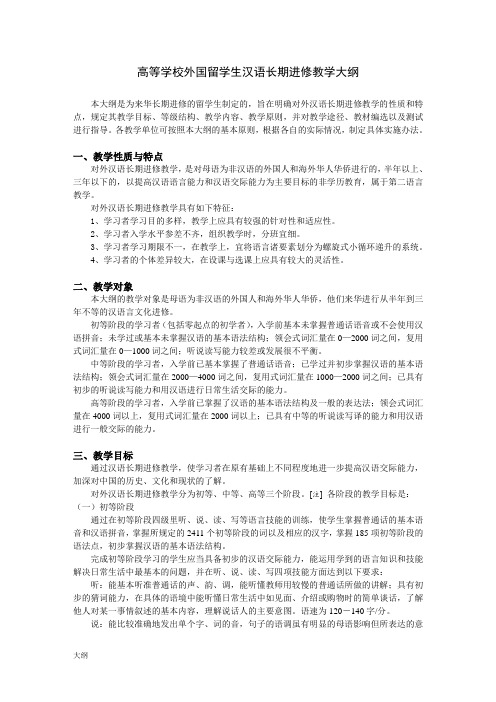
高等学校外国留学生汉语长期进修教学大纲本大纲是为来华长期进修的留学生制定的,旨在明确对外汉语长期进修教学的性质和特点,规定其教学目标、等级结构、教学内容、教学原则,并对教学途径、教材编选以及测试进行指导。
各教学单位可按照本大纲的基本原则,根据各自的实际情况,制定具体实施办法。
一、教学性质与特点对外汉语长期进修教学,是对母语为非汉语的外国人和海外华人华侨进行的,半年以上、三年以下的,以提高汉语语言能力和汉语交际能力为主要目标的非学历教育,属于第二语言教学。
对外汉语长期进修教学具有如下特征:1、学习者学习目的多样,教学上应具有较强的针对性和适应性。
2、学习者入学水平参差不齐,组织教学时,分班宜细。
3、学习者学习期限不一,在教学上,宜将语言诸要素划分为螺旋式小循环递升的系统。
4、学习者的个体差异较大,在设课与选课上应具有较大的灵活性。
二、教学对象本大纲的教学对象是母语为非汉语的外国人和海外华人华侨,他们来华进行从半年到三年不等的汉语言文化进修。
初等阶段的学习者(包括零起点的初学者),入学前基本未掌握普通话语音或不会使用汉语拼音;未学过或基本未掌握汉语的基本语法结构;领会式词汇量在0—2000词之间,复用式词汇量在0—1000词之间;听说读写能力较差或发展很不平衡。
中等阶段的学习者,入学前已基本掌握了普通话语音;已学过并初步掌握汉语的基本语法结构;领会式词汇量在2000—4000词之间,复用式词汇量在1000—2000词之间;已具有初步的听说读写能力和用汉语进行日常生活交际的能力。
高等阶段的学习者,入学前已掌握了汉语的基本语法结构及一般的表达法;领会式词汇量在4000词以上,复用式词汇量在2000词以上;已具有中等的听说读写译的能力和用汉语进行一般交际的能力。
三、教学目标通过汉语长期进修教学,使学习者在原有基础上不同程度地进一步提高汉语交际能力,加深对中国的历史、文化和现状的了解。
对外汉语长期进修教学分为初等、中等、高等三个阶段。
留学英文学习计划模板
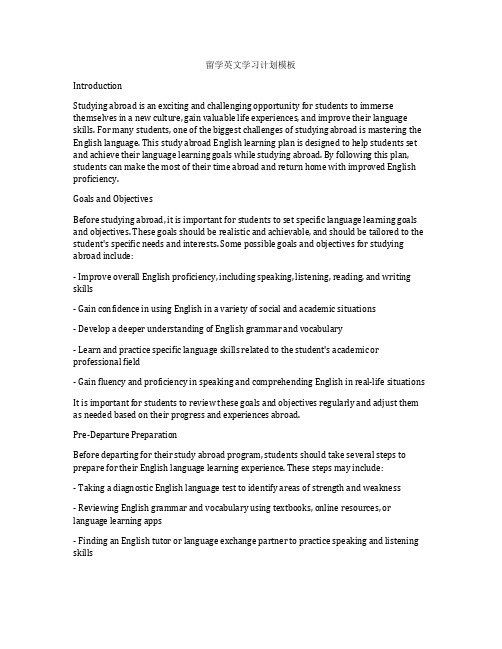
留学英文学习计划模板IntroductionStudying abroad is an exciting and challenging opportunity for students to immerse themselves in a new culture, gain valuable life experiences, and improve their language skills. For many students, one of the biggest challenges of studying abroad is mastering the English language. This study abroad English learning plan is designed to help students set and achieve their language learning goals while studying abroad. By following this plan, students can make the most of their time abroad and return home with improved English proficiency.Goals and ObjectivesBefore studying abroad, it is important for students to set specific language learning goals and objectives. These goals should be realistic and achievable, and should be tailored to the student's specific needs and interests. Some possible goals and objectives for studying abroad include:- Improve overall English proficiency, including speaking, listening, reading, and writing skills- Gain confidence in using English in a variety of social and academic situations- Develop a deeper understanding of English grammar and vocabulary- Learn and practice specific language skills related to the student's academic or professional field- Gain fluency and proficiency in speaking and comprehending English in real-life situations It is important for students to review these goals and objectives regularly and adjust them as needed based on their progress and experiences abroad.Pre-Departure PreparationBefore departing for their study abroad program, students should take several steps to prepare for their English language learning experience. These steps may include:- Taking a diagnostic English language test to identify areas of strength and weakness- Reviewing English grammar and vocabulary using textbooks, online resources, or language learning apps- Finding an English tutor or language exchange partner to practice speaking and listening skills- Researching the cultural and social aspects of the destination country to gain a better understanding of how English is used in daily lifeIt is important for students to use this time to build a strong foundation in English language skills before they arrive in their study abroad destination.In-Country Language Learning StrategiesOnce students arrive in their study abroad destination, they should continue to focus on improving their English language skills. Some effective language learning strategies that students may consider include:- Enrolling in an English language course or program offered by the host institution- Participating in language exchange programs with native English speakers or other international students- Attending cultural events, lectures, and workshops to practice listening and speaking skills - Engaging in conversation with local residents, both in formal and informal settings- Keeping a language journal to track new vocabulary, grammar structures, and expressions - Watching English-language movies, TV shows, or news broadcasts to improve listening and comprehension skills- Joining student organizations or clubs that focus on language learning and cultural exchange- Establishing regular communication with friends and family back home in English Students should be proactive in seeking out opportunities to practice their language skills and should not be afraid to make mistakes or take risks in using English.Monitoring Progress and Reflecting on LearningThroughout their study abroad experience, students should regularly monitor their progress and reflect on their language learning. This may include:- Taking regular assessments or tests to measure improvement in language skills- Seeking feedback from teachers, tutors, and language exchange partners- Reflecting on their experiences with language learning and identifying areas for improvement- Keeping a language portfolio with samples of written work, speaking exercises, and other language-related projects- Adjusting language learning goals and objectives as needed based on progress and experiences abroadBy actively monitoring their language learning progress, students can make adjustments and improvements to their English language skills as they continue their study abroad journey.Returning Home and Maintaining Language SkillsAfter completing their study abroad program, students should continue to maintain and improve their English language skills. Some possible ways to do this may include:- Finding local language exchange partners or conversation clubs to continue practicing speaking and listening skills- Taking advanced English language courses at their home institution or in their local community- Reading English-language newspapers, magazines, and books to maintain and expand vocabulary and reading skills- Watching English-language movies, TV shows, or YouTube videos to continue improving listening and comprehension skills- Using online language learning platforms and apps to practice grammar, vocabulary, and speaking skills- Finding opportunities for internships, volunteer work, or professional experiences that require English language proficiencyBy continuing to use and improve their English language skills, students can maintain the gains they made during their study abroad experience and continue to develop their language proficiency.ConclusionStudying abroad provides a unique opportunity for students to improve their English language skills in an immersive and authentic context. By setting and pursuing specific language learning goals, utilizing effective language learning strategies, monitoring progress, and maintaining language skills upon returning home, students can make the most of their study abroad experience and develop a high level of English proficiency. This study abroad English learning plan can serve as a valuable guide for students as they navigate their language learning journey abroad.。
海外学习计划书中英文
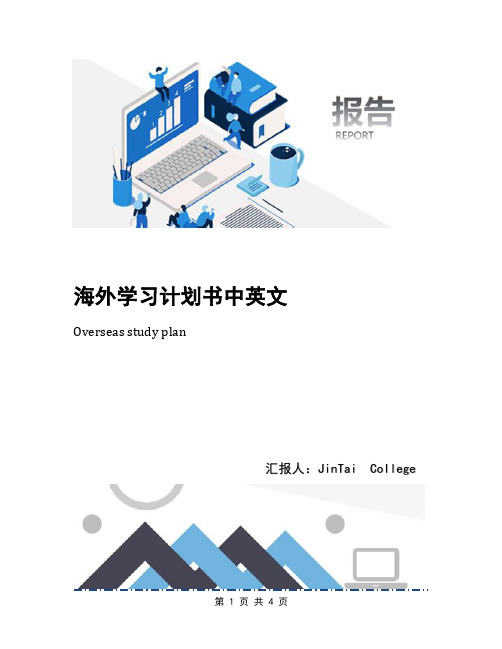
海外学习计划书中英文Overseas study plan汇报人:JinTai College海外学习计划书中英文前言:工作计划是对一定时期的工作预先作出安排和打算时制定工作计划,有了工作计划,工作就有了明确的目标和具体的步骤,大家协调行动,使工作有条不紊地进行。
工作计划对工作既有指导作用,又有推动作用,是提高工作效率的重要手段。
本文档根据工作计划的书写内容要求,带有规划性、设想性、计划性、方案和安排的特点展开说明,具有实践指导意义。
便于学习和使用,本文档下载后内容可按需编辑修改及打印。
魏潇赟,xxx大学物理科学学院大三学生,专业为物理学类光学方向,在校期间参与题为“超材料实现可见光宽带动态偏振转化”国创项目。
本次为期三月的访学,希望能够借此机会接触一下国外科研,感受不同的学术氛围,选择UCI为访学学校是由于双方都有访学交流的经验,而且听学长的'报告感觉整个经历也很有意义。
访学具体时间为20xx年10月10号-20xx年01月10号。
访学阶段(2015/10-2015/12):交流期间会遵从实验室的工作时间,首先阅读文献,了解自己将要研究的方向;其次熟悉实验流程以及实验操作,尽心完成老师所布置的任务。
感谢学院提供的这次机会,我们都会珍惜并好好利用!Study PlanI am Wei Xiaoyun, a junior of School of physics, Nankai University.I majored in physics and took partin the item entitled "metamaterialto achieve visible broadband dynamic polarization transformation".During this three-month visit, I hope to takethis opportunity to contact with oversea research, experience different academic environment.The reason selecting UCI as the schoolfor this visit is that both sides have the experiences of exchange students, andI feel the experience is very meaningful.While I was listening to the report of the seniorVisiting time is from October 10, 2015 to January 10, 2016.School stages (2015/10-2015/12): First I will read pa-pe-rs and understand their research item. Then I am going to study the experimental procedure andoperation, and next complete tasks assigned by my tutor.Thank the Academy for offering this opportunity and Iwill cherish and take advantage.-------- Designed By JinTai College ---------。
面向留学生的英文课程概述(小括号内为说明文字,请用英语
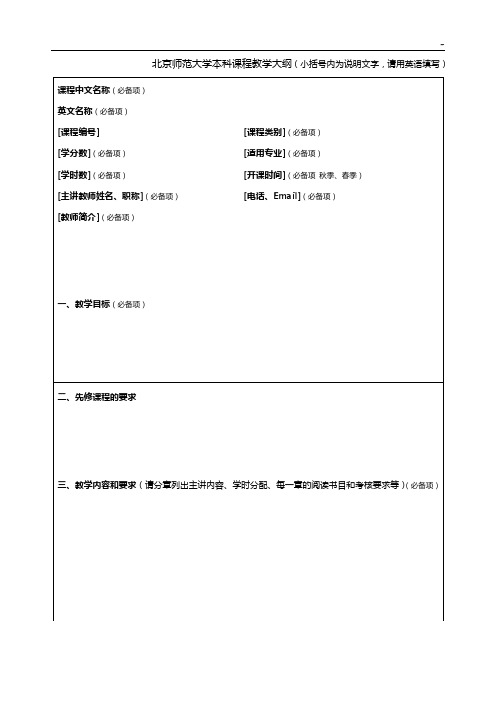
二、先修课程的要求
三、教学内容和要求(请分章列出主讲内容、学时分配、每一章的阅读书目和考核要求等)(必备项)
三、教材及参考资ห้องสมุดไป่ตู้(必备项)
四、课程考核方式及成绩计算方法(必备项)
北京师范大学本科课程教学大纲(小括号内为说明文字,请用英语填写)
课程中文名称(必备项)
英文名称(必备项)
[课程编号]
[课程类别](必备项)
[学分数](必备项)
[适用专业](必备项)
[学时数](必备项)
[开课时间](必备项 秋季、春季)
[主讲教师姓名、职称](必备项)
[电话、Email](必备项)
[教师简介](必备项)
- 1、下载文档前请自行甄别文档内容的完整性,平台不提供额外的编辑、内容补充、找答案等附加服务。
- 2、"仅部分预览"的文档,不可在线预览部分如存在完整性等问题,可反馈申请退款(可完整预览的文档不适用该条件!)。
- 3、如文档侵犯您的权益,请联系客服反馈,我们会尽快为您处理(人工客服工作时间:9:00-18:30)。
Objectives
知识点和需要理解
课程的教学目的是理解现代电子商务知识。课程集合经济学和商务基本理论,帮助学生理解:电子商务不仅是一种网络交易工具,也是一种现代商务管理思想和工具。因此课程教学目标为:
1、使用电子商务技术实现电子商务网络交易;
2、分析市场机会、市场影响运作和企业管理。
Knowledge and understanding:
The purpose of this course is to know the knowledge of the modern Electronic commerce. The course combines the use of economics and commerce theory to help students understand that Electronic commerce not only is a network trade tool but also a management tool for modern commerce and business. Therefore, the aims and objectives of this course including:
2
Customer Relationship Management;
Lecture
Assignment:6.3
10
……
2
Online Auctions, Virtual Communities, and Web Portals
Discuss
Discuss
Assignment:7.4
11
2
The Environment of Electronic Commerce: Legal, Ethical, and Tax Issues
Teachingmethods:
Group work, case study, classroom learning, presentation,Team works, multimedia, field study will be used in the course.
案例研究和课堂报告教学:
案例研究教学主要是用于评估学生具体的电子商务应用能力。学生要求使用PPT展示和报告他们在学习中的具体发现。要求学生现场提交打印的案例研究学习报告。
(Subject to Change; LastUpdated:March17,2017)
校历周次
Week
授课日期
Date
学
时
数
hrs
教学内容
安排
Topic
教学
形式
Format
教学手段
Activity
课后作业或辅导安排
Require reading/
Assignment
执行情况
application
评价与考试
ቤተ መጻሕፍቲ ባይዱAssessments
所有考试内容均在制定的教材上。学生允许使用不能编程的计算机参加考试。
期末考试40%
案例学习30%
家庭作业15%
课堂表现15%
合计100%
All exams in this course will be closed book. You may use a non-programmable calculator.
2.be able to sell on the Web and understand the revenue models and building a web presence and can plan for Electronic Commerce;
3.be able to use Electronic Commerce to conduct marketing on the web;
教学参考资料
References
1、E-commerce (Bilingual),胡玫艳,黄华,何龙,清华大学出版社,2014.
2、/jpkc_xj/dzsw/
3、/dzsykl/
4、/
团队小组学习:
家庭作业、案例学习和报告展示是在学生团队讨论学习之后进行的,并以小组为单位提交学习报告,小组的每个成员将得到相同的考核分数。每个小组要求给每个成员分配具体任务,并组织小组学习和讨论。
Team Work
Homework assignments and case study and make presentation will be completed for students are finished in teams and team members will work together to produce a joint report, and each member of a team will receive the same mark for the report. It is up to each team to allocate responsibilities between team members and organize its own work.
Lecture
Presentations
Reading:
Marketing Strategies
7
2
B2B Strategies
Lecture
Lab experience
Assignment:4.5
8
2
B2CStrategies
Lecture
Lab experience
Assignment:5.3
9
English
先修课程
Prerequisites
Non
适用专业
Designed for
International Business
课程性质
Compulsory/Selective
compulsory
学分
Credits
2
总学时数
Contact Hours
32
开课学院
Offered in
InternationalCollegeofEconomicsand Trade
2、能在网络上进行买卖交易和商品的网络呈示、并筹划网店;
3、能进行网络营销;
4、能理解电子商务应用中的重要概念,包括B2B战略、电子商务环境和电子商务支付等。
Skill and ability to
1.be able to understand basic the concepts and advantages of Electronic commerce;
4.be able to understand the other important concepts and applications of Electronic Commerce, including B2B Strategies, the environment of Electronic commerce, payment systems for Electronic commerce.
后继课程:
国际商务物流、国际市场营销
Further studying:
International Business Logistics;International Marketing;
课程教学要求
Teaching Methods &
Requirements
教学方法:
主要包括、案例研究学习、课堂教学、课堂报告、小组团队学习,多媒体展示教学,实地调研与学习
任课教师
Lecturer
Li Xinwu
编写人
Editor
Li Xinwu
大纲主审人
Proofreader
XXX
课程负责人
Head of Course
Li Xinwu
翻译
Translator
Li Xinwu
使用教材
Text Books
Electronic Commerce——A Managerial and Social Networks Perspective, Efraim Turban,Thomson Learning, Inc, 2014.
14
2
EC Logistics
Lecture
Assignment:11.3
15
2
EC Security
Lecture
1、using Electronic commerce to realize internet trading;
2、analyzing market chances , conduct marketingand enterprises management.
需要掌握的技能包括:
1、理解电子商务的基本概念和应用优势;
附件4:教学大纲
《电子商务》
课程教学大纲
课程编号:
制定单位:国际经贸学院
制定人(执笔人):黎新伍
审核人:
制定(或修订)时间:2017年3月17日
江西财经大学
《电子商务》课程教学大纲
1、GENERALINFORMATION
课程名称
Course Name
Electronic Commerce
授课语言
Teaching Language
5
2
Marketing on the web:Advertising on the Web,E-Mail Marketing
Lecture
Discuss
Assignment:3.8
6
2
Marketing on the web:Creating and Maintaining Brands on the Web,Search Engine Positioning and Domain Names
